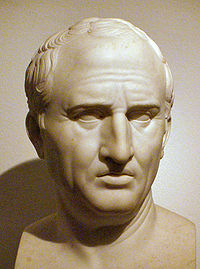
Today I thought I'd write a post in memory of Cicero, the high-flying Roman author and politician. He was executed on 7 December 43 BC, by order of Mark Anthony, because Cicero had attacked him in some of his speeches (there's more about his execution
here).
Cicero was pretty much the leading intellectual in Rome at the time, and much of what we know about this period comes from his writings. But he was more than a bit self-obsessed (the greatest compliment he paid to his beloved daughter, for example, was that she was "the image of my face and speech and mind"). And although he loved politics, and tried to play with the most powerful figures in Rome - Pompey, Caesar and Mark Anthony - he had a knack of annoying the wrong person and was banished from Rome more than once. When excluded from politics he wrote about philosophy - he loved Greek philosophy in particular and made it his mission to translate it into Latin for a Roman audience.
It's from these writings that we have the best evidence from ancient texts that the Greeks were making geared astronomical devices like the
Antikythera mechanism. For example, in
On the Nature of the Gods, he wrote about an instrument "recently constructed by our friend Posidonius, which at each revolution reproduces the same motions of the Sun, the Moon and the five planets that take place in the heavens each day and night". He went on to ask: "Suppose someone carried this to Scythia or to Britain. Surely no one in those barbaric regions would doubt that the orrery had been constructed by a rational process?" His point was that just as the sphere had an intelligent creator, so did the universe - an early incarnation of the (mistaken in my opinion) school of thought known as
intelligent design.
That's not the only aspect of Cicero's work still relevant today. His persuasive speeches were famous throughout the Roman empire, and a
recent article in the Guardian by Charlotte Higgins argues that Barack Obama bases his own speeches on the principles pioneered by Cicero:
"...One of the best known of Cicero's techniques is his use of series of three to emphasise points: the tricolon. (The most enduring example of a Latin tricolon is not Cicero's, but Caesar's 'Veni, vidi, vici' - I came, I saw, I conquered.) Obama uses tricola freely. Here's an example: "Tonight, we gather to affirm the greatness of our nation, not because of the height of our skyscrapers, or the power of our military, or the size of our economy ..." In this passage, from the 2004 Democratic convention speech, Obama is also using the technique of 'praeteritio' - drawing attention to a subject by not discussing it. (He is discounting the height of America's skyscrapers etc, but in so doing reminds us of their importance.)..."
If anyone wants to know more about Cicero (or the Greeks and Romans in general) I heartily recommend Robin Lane Fox's book
The Classical World. There's colour, passion, drama and lots of detail - it totally immerses you in the stories of these ancient civilisations.